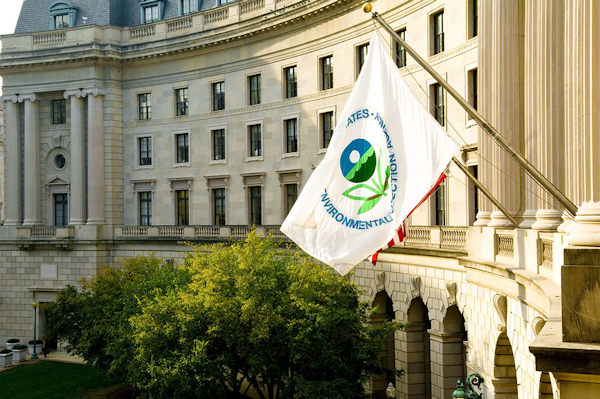SEJournal Online is the digital news magazine of the Society of Environmental Journalists. Learn more about SEJournal Online, including submission, subscription and advertising information.
 |
 |
| For years, one of the biggest complaints of environmental reporters has been their treatment at the hands of press officers at the U.S. Environmental Protection Agency, writes WatchDog Opinion. Above, EPA headquarters in Washington, D.C. Photo: U.S. EPA via Flickr Creative Commons (U.S. government work). |
WatchDog Opinion: Attention Press Officers — Read This Reporter’s Bill of Rights
By Joseph A. Davis
Donald Trump’s election to a second term is giving WatchDog Opinion a censorship flashback.
Remember his first term, when the U.S. Environmental Protection Agency’s press office shattered norms in restricting media access to agency staff, scientists and information? We fear this time it will be worse.
Over the decades, the issue of EPA press office treatment of inquiring reporters has consistently been the biggest complaint from members of the Society of Environmental Journalists — in both Democratic and Republican administrations.
SEJ has tried to address
the problem in many ways.
It rarely made much difference.
 |
And SEJ has tried to address the problem in many ways. Discussing privately and publicly. Doing surveys. Negotiating. Going up the hierarchy. Complaining. Protesting. Exposing. It rarely made much difference. (Although the Biden EPA improved things a little.)
SEJ has taken positions calling for better press office openness numerous times, often in coalitions with other journalism groups. Here is one of the latest.
It’s not rocket science. Press officers can actually build positive, trusting relationships with reporters by helping them get information. They can avoid unnecessarily bad PR by not concealing things, lying, ignoring the media or attacking them.
In that spirit, we are updating our reporter’s bill of rights from the early days of the Biden administration. It’s for all agency press offices — not just the EPA.
What journalists expect
- Prompt response to phone calls and emails (prompt means within deadline). Some response is better than no response.
- Strong limits on “background” rules. Public information office staff response presumed to be on the record. Rules of attribution do not apply unless or until a reporter agrees. No limits on subjects for questions. Interviews with agency staff and scientists should be on the record.
- Press officers who know what they are talking about and are able to speak on the record. Press officers should not make reporters wait while they ask political appointees what to say. Avoid vague, anonymous emails and desk statements.
- Press conferences on the record with adequate, open questioning. Earlier notification of pressers. Phone technology for pressers that works and is transparent. Encourage questions from small, as well as large, outlets.
- Access to agency documents without FOIA hurdles when possible. Preemptive disclosure. Expedited processing of news media FOIA requests.
- Fairness of access for media of different sizes, types, locations. Includes advisories.
- Agency employees (especially scientists) should be free to talk to reporters without press office permission or minders, and without restrictions on what they can talk about.
- Access to agency data and data tools.
- Help with stories. The press officer’s job is not to spin or obstruct, but to guide reporters to people, phone numbers, emails, facts, reports, images, audio, video, policies, studies, memos, backgrounders and context.
- Accuracy, honesty, openness and truth. Civility and professionalism.
Signs to watch for
It may take months for the new EPA staffing to roll out, but the WatchDog will be watching.
Historically two positions matter most. One is the associate administrator of the Office of Public Affairs, which sits within the Office of the Administrator.
The other is the EPA press secretary, who has often served as the frontline spokesperson for the administrator. Will it be campaign loyalists who fill such slots?
This concern is hardly limited to
the EPA. It’s a problem for journalists
covering other agencies within SEJ’s purview.
This concern is hardly limited to the EPA. It’s a problem for journalists covering other agencies within SEJ’s purview.
That includes the Interior Department and all of its 11-plus bureaus and offices at every geographical level. Or the National Oceanic and Atmospheric Administration and its many subagencies. Not to mention the Agriculture Department (where the Forestry Service lives).
Or the Centers for Disease Control and Prevention, the Food and Drug Administration, the National Institutes of Health and the National Science Foundation. Or the White House and its agencies, such as the Office of Management and Budget, the Council on Environmental Quality or the Office of Science and Technology Policy.
We will wait and see.
[Editor’s Note: Check out more WatchDog Opinion columns on prospects under Trump for press freedom and the criminalization of journalism. And be sure to visit our new, weekly EJ TransitionWatch column for regular coverage of the incoming Trump White House.]
Joseph A. Davis is a freelance writer/editor in Washington, D.C. who has been writing about the environment since 1976. He writes SEJournal Online's TipSheet, Reporter's Toolbox and Issue Backgrounder, and curates SEJ's weekday news headlines service EJToday and @EJTodayNews. Davis also directs SEJ's Freedom of Information Project and writes the WatchDog opinion column.
* From the weekly news magazine SEJournal Online, Vol. 9, No. 42. Content from each new issue of SEJournal Online is available to the public via the SEJournal Online main page. Subscribe to the e-newsletter here. And see past issues of the SEJournal archived here.









 Advertisement
Advertisement 


